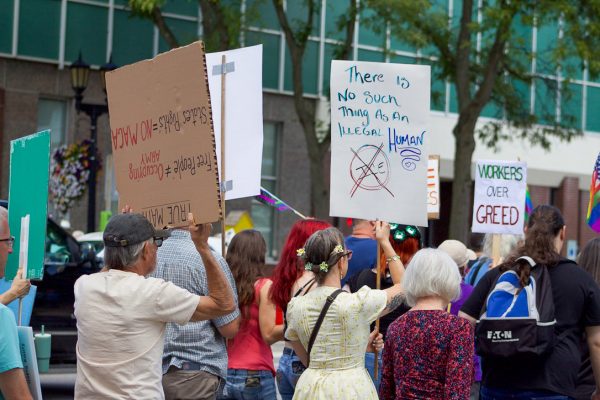Residents and students of Kent, like many in other cities, took to the streets Monday afternoon at the “Workers over Billionaires” protest.
The protests were led by the national labor federation, AFL-CIO, and aimed to express frustrations with President Donald Trump’s recent actions impacting unions and workers’ rights.
Many held signs and voiced their anger with Trump’s administration for its “anti-union” and “pro-billionaire” semblance.
“In the streets and on the shop floor, in union halls and the halls of Congress, working people are rising up, speaking out and fighting for an economy, a government and a country for the people—not the billionaires,” the event website stated.

One Kent resident, Jean Daigneau, attended the protest on Main Street to express her feelings publicly toward the policy.
“Somebody has to stand up and fight for them, or we’re all gonna lose everything,” Daigneau said.
Earlier this year, Trump signed an executive order to exclude certain agencies from the Civil Service Reform Act of 1978, an action that would remove employee bargaining rights from dozens of federal agencies. He signed a second order furthering these exclusions.
As a result, union contracts in several federal departments have been striked, cancelling rights for nearly half a million workers.
“We have a ‘union buster’ mentality going on in Washington–that’s why I’m here,” said Kent State graduate Karen Bennett, another protester. “If we don’t have workers and workers don’t have rights, we don’t have a country.”
Union work has generated many standards that workers still have today including hours, salary and benefits, but it has all been taken for granted, said Kent State graduate and protestor Jodie Grasgreen.
“People without unions don’t get rights,” Grasgreen said.

Union membership is declining and has hit a record low, according to the Center for Economic and Policy Research.
In addition to recent federal cuts and the decline of unions, the structure of the National Labor Relations Board (NLRB), which determines labor law violations and observes union activity, has been ruled unconstitutional by the Court of Appeals Fifth Circuit.

While the ruling does not abolish the NLRB, it indicates an issue that leaves many uncertain about its future.
“When this country had a strong union movement, we had a strong middle class, we had economic growth; you didn’t have the giant gap between the rich and the working class and the poor,” Grasgreen said. “That gap is the downfall of every democracy.”
Ari Collins is a beat reporter. Contact her at [email protected].
Lex Radde is a reporter for KSTV. Contact her at [email protected].


